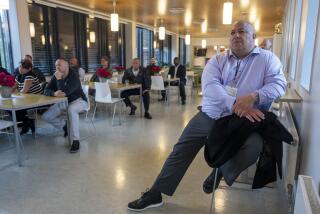Norway Mulls Merits of Private Care for Elderly
- Share via
OSLO — If dignity, comfort and security are already guaranteed for Norway’s senior citizens, should luxury also be on offer for those who can afford it?
Such a question might seem frivolous in most parts of the capitalist world, but it is provoking a heated and divisive debate in this country, where social equality has long been a cherished attribute of life.
Politicians and the public alike have so far rejected proposals for private construction of exclusive nursing homes and assisted-care residences. Norwegians fear that elite facilities would drain off the best caregivers in the nursing profession, which is already short-handed because of full employment, and cause a drop in quality for the majority under state care.
Norway spends more per capita on caring for its elderly than any other country, a consequence of both post-World War II prosperity and the nation’s long-standing commitment to social welfare. Nearly 10% of the annual budget goes to an elaborate network of facilities and services to fulfill the government’s guarantee to its 4.4 million citizens that everyone will have a cost-free private apartment after retirement, along with whatever assistance he or she needs.
But with many Norwegians now reaching retirement age with significant savings and real estate holdings, politicians are pondering whether to open the door to private industry in an area that has always been regarded here as a public responsibility.
“People in Scandinavia believe very strongly that everyone should live equally. That’s why this discussion has caused such a furor. Everyone worries that the competition for employees will be won by those willing to pay more,” says Ingrid Vigerust, spokeswoman for the Ministry of Health and Social Affairs.
Having lived for several years in Texas, Vigerust says, she was appalled at the vast gulf in quality in the U.S. between nursing homes dependent on state funding and those offering for-profit care. Such injustice would never be tolerated in Norway, she adds, by way of explaining the fierce public opposition to commercially-provided improvements.
At the Skinnarberga retirement center in Kongsberg, not far from Oslo, residents cluck at the folly of trying to fix a system that isn’t broken.
“This is just fine. What more does one need?” asks Anna Marie Lie, 89, gesturing around her two-room apartment, one of a handful clustered around common rooms where cooks, maids and nurses take care of the meals, housekeeping and medications.
While that attitude is prevalent among today’s pensioners, government planners note that Norway’s demographics will impose a disproportionate burden on taxpayers over the next decade. Birthrates fluctuated wildly during the second half of the 20th century, distorting the balance between those leaving the work force and those still contributing to the tax base. The average life expectancy has also risen significantly, notes Svein Olav Daatland of the government social research office. That means each new generation entering elderly care will be drawing on its resources longer.
“The system is good now, but there are big challenges ahead,” says Magnhild Meltveit Kleppa, the minister of health and social affairs. “There’s been too little study of whether people might be willing to pay for the care they get.”
In pursuit of budget savings, Kleppa says, the Norwegian parliament this spring will debate the merits of opening up services to private enterprise to ensure that sufficient care is available as the proportion of the population older than 80 grows ever bigger.
The discussion is expected to provoke another confrontation with tradition--over whether Norway’s barriers to immigration should be lowered to let in the health care professionals needed to fill the labor gap.
“This is one of the issues being discussed, but there is a lot of resistance to having foreigners as care providers because of the language barrier,” says Britt Slagsvold of the social research office.
But the elderly, like other Norwegians, need to change their thinking, Daatland says.
“We have to learn that we live in a larger world,” says the researcher. “Many of those we refer to as immigrants have been here for two or three generations and speak perfect Norwegian. As with the private-care issue, it is more a problem of accepting the need for change.”
More to Read
Sign up for Essential California
The most important California stories and recommendations in your inbox every morning.
You may occasionally receive promotional content from the Los Angeles Times.














